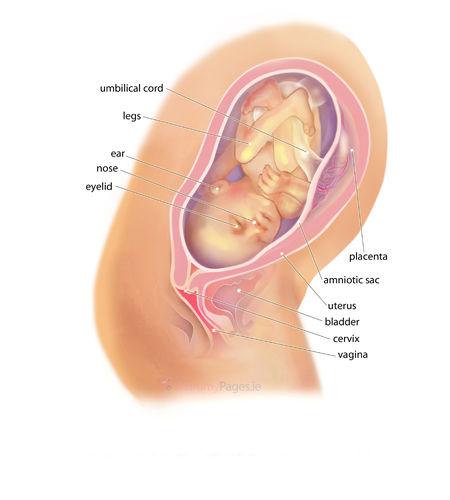Week 31 is here and you are getting closer to the day when your precious little baby makes his grand entrance into your life. All of his body functions are working now and he is fine tuning a few last developments. Your body is no doubt tired most days now as you carry all that extra weight, but your spirits are high, for you only have a few weeks left now!

Your Baby this Week

Your baby is now around the size of a squash at about 40cm (16 inches) long and weighing in at between 1.1 to 1.7kg (2.5 to 3.8lbs).
If his legs were stretched out he would measure about 41cm (16 inches) long! He is so big! However, now at week 31, the growth spurt will slow down a bit. Between now and the time your baby is born, he will put on about another kilo (2 more pounds).
Your baby’s brain is in its final stages of development, connecting nerve cells at a rapid pace. His lungs are much more mature at 31 weeks gestation as is his digestive tract, which is functioning daily just as it would if he were born. Additionally, his testes continue to descend into their location in the scrotum. Sometimes this process will take the entire pregnancy to complete.
Your baby’s layers of fat are continuing to grow. His legs and arms are completely proportionate to his head now. And, speaking of his head, his hair is getting fuller and longer. The hair on his body though (the lanugo) continues to fall off.
Your baby listens to the sound of your voice daily now and can recognise it. By the time he arrives, he will be able to pick your voice out of a crowd. This means that your baby can also hear everything else that goes on in your world, so remember, it’s a good time to avoid commotion. Try to keep your atmosphere peaceful and calming.
Your Body this Week

Week 31 is here and you are probably feeling huge now! No worries… remember, it won’t be long now. As your weight increases more and more each week, your backaches may worsen. The ligaments and muscles that hold your stomach in place are stretched and getting looser in anticipation of your body going into labour. If your backaches are severe or debilitating, try to wear a pregnancy girdle. You can get them at just about any maternity boutique. Some women say they are very helpful in holding up the abdomen and giving the ligaments and muscles a break. Naturally, if the pain from your backaches is too severe, you should see your doctor.
Your prenatal visit should take place around 31 weeks. During this visit, your doctor will do the usual checks; weight, blood pressure, measure your uterus, check your urine, and listen to the baby’s heart rate.
- Your weight should be about 9kg (19 pounds) heavier than your pre-pregnancy weight.
- Your blood pressure should remain normal. Any changes could indicate high blood pressure or preeclampsia.
- Urine tests can show if there is an infection, a high sugar level, or protein. Sugar can indicate gestational diabetes and protein can indicate high blood pressure.
- Your uterus at 31 weeks should be located about 8 to 10 cm (3 to 4 inches) below the centre of your ribcage. (When your doctor checks your uterus now, he will also be able to tell if the baby has turned head down yet.)
- The doctor will also listen to the baby’s heart to measure the rate and check for other abnormalities.
You could notice a new symptom again this week – breathlessness. Being short of breath is a common occurrence in the later stages of pregnancy and is usually nothing to be concerned about. The breathlessness occurs because your baby is pressing against your lungs making it feel like breathing is laboured. When this happens, just change positions and you will probably notice that it stops. However, if you cannot get this feeling to stop, contact your doctor.







